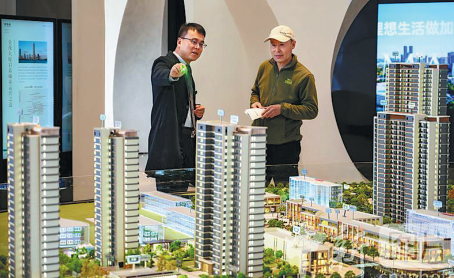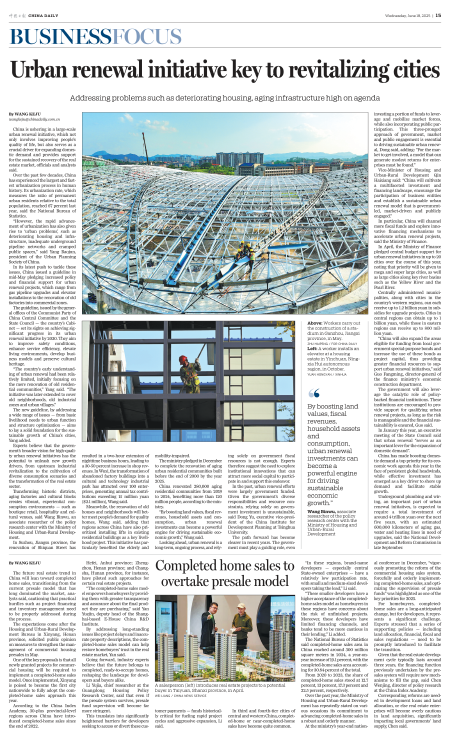
A salesperson (left) introduces real estate projects to a potential buyer in Taiyuan, Shanxi province, in April.
The future real estate trend in China will lean toward completed home sales, transitioning from the current presale model that has long dominated the market, analysts said, cautioning that practical hurdles such as project financing and inventory management need to be properly addressed during the process.
The expectations come after the Housing and Urban-Rural Development Bureau in Xinyang, Henan province, solicited public opinion on measures to strengthen the management of commercial housing presales in May.
One of the key proposals is that all newly granted projects for commercial housing will be required to implement a completed-home sales model. Once implemented, Xinyang is poised to become the first city nationwide to fully adopt the completed-home sales approach this year.
According to the China Index Academy, 30-plus provincial-level regions across China have introduced completed-home sales since the end of 2022.
Hefei, Anhui province; Zhengzhou, Henan province; and Changsha, Hunan province, for instance, have piloted such approaches for certain real estate projects.
"The completed-home sales model empowers homebuyers by providing them with greater transparency and assurance about the final product they are purchasing," said Yan Yuejin, deputy head of the Shanghai-based E-House China R&D Institute.
By addressing long-standing issues like project delays and inaccurate property descriptions, the completed-home sales model can help restore homebuyers' trust in the real estate market, Yan said.
Going forward, industry experts believe that the future belongs to completed, ready-to-occupy homes, reshaping the landscape for developers and buyers alike.
Li Yujia, chief researcher at the Guangdong Housing Policy Research Center, said that even if the presale system survives, presale fund supervision will become far more stringent.
This translates into significantly heightened barriers for developers seeking to access or divert these customer payments — funds historically critical for fueling rapid project cycles and aggressive expansion, Li said.
In third and fourth-tier cities of central and western China, completed-home or near-completed-home sales have become quite common.
"In these regions, brand-name developers — especially central State-owned enterprises — have a relatively low participation rate, with small and medium-sized developers taking the lead," Li said.
"These smaller developers have a higher acceptance of the completed-home sales model as homebuyers in these regions have concerns about the risk of unfinished projects. Moreover, these developers have limited financing channels, and banks tend to be more cautious in their lending," Li added.
The National Bureau of Statistics said completed-home sales area in China reached around 300 million square meters in 2024, a year-on-year increase of 19.1 percent, with the completed-home sales area accounting for 30.84 percent of the total.
From 2020 to 2023, the share of completed-home sales stood at 12.7 percent, 13 percent, 17.3 percent and 22.5 percent, respectively.
Over the past year, the Ministry of Housing and Urban-Rural Development has repeatedly stated on various occasions its commitment to advancing completed-home sales in a robust and orderly manner.
At the ministry's year-end national conference in December, "vigorously promoting the reform of the commercial housing sales system, forcefully and orderly implementing completed-home sales, and optimizing the supervision of presale funds" was highlighted as one of the key priorities for 2025.
For homebuyers, completed-home sales are a long-anticipated change, but for developers, it represents a significant challenge. Experts stressed that a series of supporting policies — including land allocation, financial, fiscal and sales regulations — need to be promptly introduced to facilitate the transition.
Given that the real estate development cycle typically lasts around three years, the financing function previously undertaken by the presales system will require new mechanisms to fill the gap, said Chen Wenjing, director of policy research at the China Index Academy.
Corresponding reforms are needed in development loans and land allocation, or else real estate enterprises will become overly cautious in land acquisition, significantly impacting local governments' land supply, Chen said.

